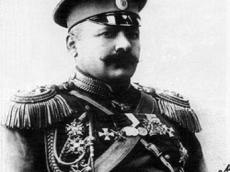|
|
TODAY.AZ / Arts & Entertainment
Azerbaijani general’s statue to be erected in St. Petersburg
11 February 2015 [18:43] - TODAY.AZ

By Amina Nazarli
The statue of Huseyn Khan Nakhchivanski, Russian Empire General-Adjutant of Azerbaijani origin will be erected in St. Petersburg.
The statue will be erected in the intersection of Malaya Posadnaya and Michurinskaya streets, Russian media reported.
The bronze statue will be 2.5 metres in height. It will be made by sculptor Boris Petrov and architect Gennadiy Peychev.
Nakhchivanski was born on July 28, 1863 in Nakhchivan City. His paternal grandfather Ehsan Nakhchivanski was the last ruler of the Nakhchivan Khanate.
In the Russo-Japanese War, Huseyn Khan Nakhchivanski was the commander of the second Dagestani cavalry regiment, and held the command of the second Cavalry Corps in the World War I.
In 1874, Huseyn Nakhchivanski was admitted to the Page Corps and graduated with honors in 1883. He received the rank of cornet and was assigned to the elite Leib Guard cavalry regiment. Nakhchivanski served there for twenty years and ascended positions from cornet to Colonel of the Leib Guard.
Khan Nakhchivanski was the commander of 44th Nizhegorodski Dragoon regiment from November 1905, and in 1906, he was made Fliegel-Adjutant of H. I. M. Retinue and appointed the commander of Leib Guard cavalry regiment, where he started his military career. In 1907, he attained the rank of major-general.
In 1912, he was appointed as the commander of 1st detached cavalry brigade, in 1914 he was conferred the rank of lieutenant-general and became the commander of 2nd cavalry division and with this position entered World War I.
He was supposedly executed by the Bolsheviks in January 1919.
Nakhchivanski, being the only Muslim General-Adjutant of the Russian Empire, received 15 Russian and 9 foreign state awards, including Order of St. George of 4th degree and Order of St. George of 3rd degree.
URL: http://www.today.az/news/entertainment/138694.html
 Print version
Print version
Connect with us. Get latest news and updates.
See Also
- 27 November 2025 [15:56]
Azerbaijan represented at int'l symposium dedicated to Silk Road - 27 November 2025 [14:20]
Tarana Muradova celebrates anniversary with fascinating dance evening - 27 November 2025 [12:19]
Young soloist takes stage in 'Asli and Kerem' opera - 26 November 2025 [18:31]
OIC Cultural Festival: Baku Creative Week 25 to feature MyForum panel sessions - 26 November 2025 [15:34]
Renowned pianist and young talent deliver heartwarming performance - 26 November 2025 [15:13]
Azerbaijani, Turkish Opera Theaters to undertake joint projects - 26 November 2025 [13:51]
Azerbaijan's cultural heritage promoted at Luxembourg Int'l Bazaar - 25 November 2025 [18:35]
Int'l Mugham Center to hold concert program themed 'Con Moto' - 25 November 2025 [15:37]
Kalbajar City Day marked with vibrant cultural events - 25 November 2025 [13:43]
Firangiz Alizadeh's music performed in Europe's concert halls
Most Popular
 China invests in Azerbaijan: new investment direction
China invests in Azerbaijan: new investment direction
 World Bank urges productivity push in Europe & Central Asia
World Bank urges productivity push in Europe & Central Asia
 Did you want "Azerbaijan next"? Choke on it! - A reminder to the Armenian revanchists
Did you want "Azerbaijan next"? Choke on it! - A reminder to the Armenian revanchists
 Next 30–50 years of hydrocarbon projects demand new mindset, says bp executive
Next 30–50 years of hydrocarbon projects demand new mindset, says bp executive
 Culture Ministry moves heritage preservation services to electronic format
Culture Ministry moves heritage preservation services to electronic format
 Sudan’s top general rejects US-led ceasefire proposal, calling it ‘the worst yet’
Sudan’s top general rejects US-led ceasefire proposal, calling it ‘the worst yet’
 Azerbaijan’s “myGov” digital government platform surpasses 2 mln users
Azerbaijan’s “myGov” digital government platform surpasses 2 mln users
